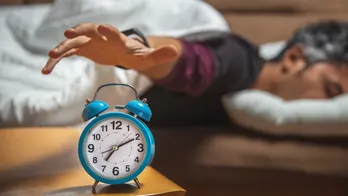Medical Monday: Bird flu case update, plus safety tips for solar eclipse viewing
The U.S. Centers for Disease Control and Prevention (CDC) has issued a health alert for a human bird flu case reported in Texas.
Fox News medical contributor Dr. Marc Siegel sat down with "Fox and Friends" on Monday, mentioning that he spoke with CDC Director Mandy Cohen, who assured him that this bird flu case is treatable.
"This person has already gotten a lot better," he said. "He got Tamiflu. He had mild symptoms – he had red eyes, he had some congestion [and] got better."
CDC ISSUES BIRD FLU HEALTH ALERT TO CLINICIANS, STATE HEALTH DEPARTMENTS, PUBLIC AFTER TEXAS FARMER INFECTED
The positive bird flu diagnosis came after milk from dairy cows in Texas and Kansas tested positive for the disease. The cattle that contracted the disease have "also gotten better," according to Siegel.

Dr. Marc Siegel speaks with "Fox and Friends" about bird flu spread and safety tips for viewing a solar eclipse. (iStock; Fox News)
The issue with bird flu, Siegel stressed, is the potential infection of poultry.
"Poultry die of it … because they have no immune system," he said. "There have been over 400 million cases [of poultry acquiring it or being killed to prevent spread] over the last 20 years."
BIRD FLU PANDEMIC IN THE FUTURE? EU WARNS OF POTENTIAL SPREAD TO HUMANS DUE TO ‘LACK OF IMMUNE DEFENSE’
"Over 2,000 people [around] the world have gotten infected; about half of them recover fully," Siegel added.
The good news, according to Siegel and Cohen, is that avian flu hasn’t mutated. If it had mutated, there would've been a chance for the disease to spread from human to human.

Poultry is most affected by bird flu because they "have no immune system," Dr. Siegel said. (iStock)
"It is not going to spread [from] human to human in this form," Siegel said.
SOLAR ECLIPSE 2024: WHERE AND HOW TO VIEW THE RARE ORBIT HITTING THE US
On the topic of humans and animals, Siegel also addressed how humans should follow their pets' cues when it comes to safe viewing of the April 8 solar eclipse.
"We should be as smart as our pets," he said. "Your dog is not going to be looking at the sun."
Siegel stressed the dangers of looking at the sun, noting that "it can burn a hole in your retina."

People observe the annular solar eclipse at the Luis Enrique Erro Planetarium of the National Polytechnic Institute in Mexico City in 2017. (Luis Barron / Eyepix Group /Future Publishing)
The only way to view the eclipse safely is through special glasses that "polarize out the light," Siegel advised.
"You cannot look directly at the sun," he said. "I’ve seen people in the emergency room … where they lose partial vision because of this."
CLICK HERE TO SIGN UP FOR OUR HEALTH NEWSLETTER
"It gets better over time, but doesn’t get completely better."

Dr. Marc Siegel joined "Fox and Friends" on Monday, April 8, 2024. (Fox News)
Siegel explained that since the nerve endings in the eye don’t extend all the way to the retina, people cannot feel the damage being done.
CLICK HERE TO GET THE FOX NEWS APP
"Normally, you would feel pain like if you burned your finger," he said. "You’re not going to feel pain if you burn your eye."
Fox News Digital's Sarah Rumpf-Whitten contributed to this report.
For more Health articles, visit foxnews.com/health
Disclaimer: The copyright of this article belongs to the original author. Reposting this article is solely for the purpose of information dissemination and does not constitute any investment advice. If there is any infringement, please contact us immediately. We will make corrections or deletions as necessary. Thank you.







